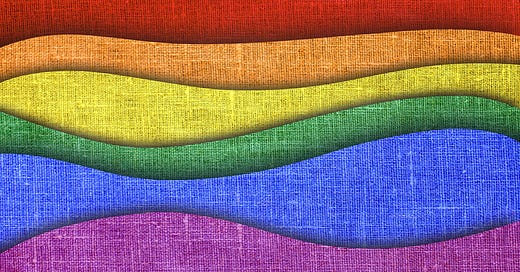There is no such thing as a straight version of me.
Becoming that impossible thing was a goal I desperately hoped for over the span of my adolescence. In the eyes of my community, there was no worse thing to be than gay—it was a Most Feared parental nightmare. As a consequence, my gayness was something I wanted not merely to suppress, but destroy. The idea of having a wife is laughably absurd to me now, but it was what teenage me thought he wanted.
Mercifully early, and with the help of a very good therapist, I abandoned this doomed effort before I entered my twenties. The liberation I felt when I came out—as bumpy as the process was, even for a 19 year old—is beyond anything I can describe in a sentence or two. The transformation from repressed, unhappy weirdo into someone with friends, a nightlife, and occasional romantic entanglements felt like learning to breathe.
Even so, I still tried to be the kind of gay who wasn’t too gay. It wouldn’t do to sound too gay, look too gay, act too gay. I wanted to be the kind of gay that straight people felt comfortable with.
In hindsight, I can see that this was in large part about self-preservation. I came out in 1994, while I was going to school in Kansas City with classmates drawn from all over my home state of Missouri, many from very conservative areas and with very conservative views themselves. Getting along as seamlessly as possible was in my best interest.
Unwinding this tightly wrapped belief that tailoring my comportment to the comfort of straight people, that there is something unappealing or even contemptible about being more obviously gay than is absolutely necessary, has taken a very long time. It is still something I am unwinding even now. But the more time goes by, the less I care about being “straight acting” (a lamentable term from the bygone days of personals ads, replaced on apps like Grindr with the truncated slang term “masc”).
The gayer I let myself be, the happier I am.
Which is why I gently object to the well-intentioned statement from straight people who say they look forward to the day when a person’s sexuality won’t matter. While I understand and appreciate the sentiment, there will never be a day my sexuality won’t matter to me. To the contrary, it matters a great deal—and always will.
Similarly, I feel a combination of annoyance and sympathy for gays who insist their sexuality is only part of who they are, and that it doesn’t define them. Having been there, I know how exhausting it can be. While it’s true that being gay is only part of me, and it doesn’t describe me in full, it’s still pretty damn important. My liver is only a part of me, too, and I’d miss it if it were gone.
No two people are exactly alike, which applies just as much to gay people as anyone else. It’s easy to find other gay guys with very little in common with me. (Circuit parties are a good place to start.) It doesn’t flatten the nuances of personality any more than any other identity does.
But my gayness isn’t circumscribed to sex or romance. It flows into my whole life. It’s in the way I dress, the way I gesture, the way I walk. It’s the shows I watch, the songs I listen to, the places I want to visit. It was in the joy I felt the minute I stepped back on a dancefloor after a year of pandemic isolation.
Take away the gayness, and you change the whole of me. A heterosexual version of me does not compute. Would that guy have even heard of Kylie Minogue? Would he watch the Super Bowl for the actual game, or only if he liked the artist doing the halftime show? Would he happily exclaim “I’m glad Rene Russo is getting work!” the first time he watched Thor?
Somehow I doubt that guy exists. And if switching my attraction to women means the rest of me shifts, too, then there is nothing I would recognize as myself as a result.
Whenever we roll around to Pride month each June, it represents two things to me.
It reminds me that Pride began as a protest, and that the rights of LGBTQIA+ people are still under attack in this country, and around the world. In state after state, trans youth are being relentlessly used as political pawns by right-wing politicians, with cruel laws being drafted and signed that block both their access to appropriate medical care and the normal activities any other kid would get to do. It sickens me, and Pride is an opportunity to shine the light on all the work that remains to be done.
Pride is also a celebration. There is a way of being in the world that would not exist without the spectrum of people represented by all the letters in LGBTQIA+ or that plus sign at the end. I take genuine pride in the kind of human experience that would not exist without gay people, and I rejoice that that is true for all the other members of the community I am part of. I love who we are.
The thing I once hated most about myself has become the part of me I cherish most. I can’t go back and tell that to the teenager I once was, but I can sure as hell tell the LGBTQIA+ teenagers out there now how special and wonderful they are. And I can be glad to be the way I am, because there is no me without it.




